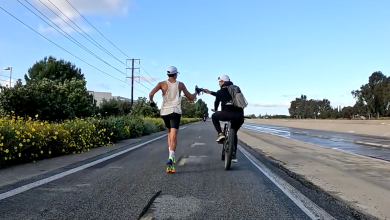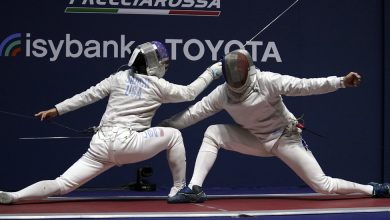Elite Runner Who Rode in a Car During a Race Is Banned for a Year

A top ultramarathoner who got a lift for part of a race has been banned for a year from competing or coaching in Britain.
The runner, Joasia Zakrzewski, a 47-year-old British woman, acknowledged that in April she traveled by car for two and a half miles of a 50-mile race from Manchester to Liverpool.
Zakrzewski said that she had injured her leg during the race, and that when she saw a friend, she accepted a ride to the next checkpoint, intending to quit. But race officials there encouraged her to continue.
A key area of dispute is what Zakrzewski told the officials. She said she mentioned having been in a car and was encouraged to finish the race unofficially, for pride. But the race marshals said they had not been told about the ride, according to a report dated Oct. 9 by an independent disciplinary panel of U.K. Athletics, the governing body for track and field and running.
Zakrzewski did run the rest of the race, and she accepted a third-place award at the finish, which she called “a miscommunication.” She blamed this in part on jet lag from having traveled from Australia just before the race.
“I made a massive error accepting the trophy and should have handed it back,” Zakrzewski said in an interview with BBC Scotland in April.
Her car trip was discovered a week after the race — tracking data showed she had completed one mile of the race in a most improbable 1 minute 40 seconds — and at that point she confessed to getting a ride and was disqualified.
When another runner, Mel Sykes, was elevated to her rightful third position, Sykes posted on social media: “Great news for me, but really bad news for sportsmanship.”
The disciplinary report noted that Zakrzewski “only disclosed what had been done when challenged by the race organizer.” It said her defense was that she was embarrassed, “but ultimately she chose not to disclose what had happened rather than embarrass herself.”
In the report, Zakrzewski acknowledges wrongdoing: “I accept my actions on the day that I did travel in a car and then later completed the run, crossing the finish line and inappropriately receiving a medal and trophy, which I did not return immediately as I should have.”
But she denied “any intention to cheat or conceal the fact that she had traveled in a car for part of the race.”
The disciplinary panel noted that there were mitigating factors, including Zakrzewski’s “state of mind on the day” because of jet lag. But it wrote that her state of mind “did not explain or mitigate against her subsequent actions, in not seeking to return her trophy, and posting about the race on social media, and she had ample opportunity to remedy the situation, which she failed to do.”
A suspension in such a case would normally be two years, the report noted, but Zakrzewski received less for mitigating factors.
Zakrzewski is an accomplished ultramarathon runner, who set a world record earlier this year by running 255 miles in 48 hours. (That record was subsequently broken.)
The most famous incident of cheating in a long-distance race remains that of Rosie Ruiz, who “won” the Boston Marathon in 1980 with the aid of a subway ride.
Even at the Olympics the temptation of long-distance runners to catch a lift once proved too much. In St. Louis in 1904, an American runner, Fred Lorz, rode 11 miles of the marathon in a car and was briefly lauded as the winner until the charade was uncovered.




